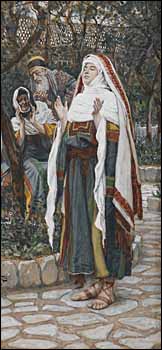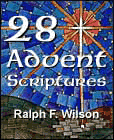Free E-Mail
Bible Studies
Beginning the Journey (for new Christians). en Español
Old Testament
Abraham
Jacob
Moses
Joshua
Gideon
David, Life of
Elijah
Psalms
Solomon
Songs of Ascent (Ps 120-135)
Isaiah
Advent/Messianic Scriptures
Daniel
Rebuild & Renew: Post-Exilic Books
Gospels
Christmas Incarnation
(Mt, Lk)
Sermon on the Mount
(Mt 5-7)
Mark
Luke's
Gospel
John's Gospel
7 Last Words of Christ
Parables
Jesus and the Kingdom
Resurrection
Apostle Peter
Acts
The Early Church
(Acts 1-12)
Apostle Paul
(Acts 12-28)
Paul's Epistles
Christ Powered Life (Rom 5-8)
1 Corinthians
2 Corinthians
Galatians
Ephesians
Vision for Church
(Eph)
Philippians
Colossians,
Philemon
1
& 2 Thessalonians
1 & 2 Timothy,
Titus
General Epistles
Hebrews
James
1 Peter
2 Peter, Jude
1, 2, and 3 John
Revelation
Revelation
Conquering Lamb of Revelation
Topical
Glorious Kingdom, The
Grace
Great Prayers
Holy Spirit, Disciple's Guide
Humility
Lamb of God
Listening for God's Voice
Lord's Supper
Names of God
Names of Jesus
Christian Art
About Us
Podcasts
Contact Us
Dr. Wilson's Books
Donations
Watercolors
Sitemap
Day 2. Blessed Are You Among Women (Luke 1:39-45)
Monday, First Week of Advent
 James J. Tissot, detail of 'The Magnificat' (1886-94), gouache on gray wove paper, Brooklyn Museum, New York. |
Read in the Bible: Luke 1:39-80
The angel appears to Mary, tells her that she will bear a son, and offers a heavenly intelligence report that her barren old relative Elizabeth is also pregnant -- and has been pregnant for six months already! (Luke 1:36). Who would have known before cell phones?
The angel offers a broad hint that Mary should contact Elizabeth. I don't know what Mary told her mother, but it was quickly arranged.
"39 At that time Mary got ready and hurried to a town in the hill country of Judea, 40 where she entered Zechariah's home and greeted Elizabeth." (Luke 1:39-40)
Mary probably travels south from Nazareth to the hill country with some trusted friends headed that direction. We don't know exactly where Elizabeth and her husband Zechariah live, but it was probably along the mountain chain south of Jerusalem, "the hill country of Judea."6 This journey of 80 to 100 miles probably takes Mary three to four days.
Blessed Are You among Women
Mary knocks on the door and greets Elizabeth. Imagine an older lady who is six months pregnant, not yet waddling to the door, but moving clumsily. Mary, the young teenager, greets her and they hug.
"When Elizabeth heard Mary's greeting, the baby leaped in her womb, and Elizabeth was filled with the Holy Spirit." (Luke 1:41)
All of a sudden Elizabeth's baby moves violently and the Spirit of God comes upon her like upon the prophets of old. Loudly, she declares:
"42b Blessed are you among women, and blessed is the child you will bear! 43 But why am I so favored, that the mother of my Lord should come to me? 44 As soon as the sound of your greeting reached my ears, the baby in my womb leaped for joy. 45 Blessed is she who has believed that what the Lord has said to her will be accomplished!" (Luke 1:42-45)
She hardly recognizes Mary as her cousin or niece. Mary has grown so much since she had seen her last. But now, by the Spirit, she recognizes her as "the mother of my Lord," months before Mary's pregnancy will even be visible.
Notice the words translated "blessed" in verses 43 and 45. Twice in verse 43 we see "blessed" translating eulogeo, "praise," here "bless, ask favor for."7 Blessings are called upon both Mary and the Child, who is at present a fetus only a few weeks old. In verse 45 "blessed" translates the adjective makarios, "pertaining to being especially favored, blessed, fortunate, happy, privileged."8 Mary is privileged to be Jesus' mother, but also fortunate that she believed the angel Gabriel who came to her. Mary is blessed for her faith, "she who has believed that what the Lord has said to her will be accomplished!" (verse 45).
The Magnificat (Luke 1:46-55)
For her part, the Spirit falls upon Mary too and she speaks out a poetic praise of God that we call "The Magnificat" (Luke 1:46-55). It speaks of her joy and privilege.
"46
My soul glorifies the Lord 47
and my spirit rejoices in God my Savior,
48 for he has been mindful of
the humble state of his servant.
From now on all generations will call me blessed,9
49 for the Mighty One has
done great things for me --
holy is his name." Luke 1:46-49
Notice Mary's amazement that God would bestow such an amazing privilege upon her, a peasant girl of humble circumstances. I think of God's blessings to me. May I never take them for granted or fall victim to a sense of entitlement, but retain my joy and humility amidst abundant blessings.
I've often pondered what must have passed between the older lady and her teenaged niece over those three months. Mary seems to have stayed with her cousin until Elizabeth gave birth, so I expect Mary heard Zechariah's prophecies about his son who would be John the Baptist. And the prophecies about her own son:
"68 Blessed
be the Lord God of Israel,
for he has visited and redeemed his people
69 and has raised up a horn
of salvation for us
in the house of his servant David." (Luke 1:68-69)
 Also available in book formats: PDF, Kindle, and paperback. |
Mary finally has someone with whom she can talk about her hopes and fears and the miracle, out-of-wedlock baby growing within her. Elizabeth provides the wisdom and comfort that Mary's mother doesn't have the perspective to provide her. God is so good to meet our needs on our sometimes difficult journeys and bring us to people whom we can encourage and who can mentor us. Praise God!
Prayer
Thank you, Father, for providing Elizabeth to Mary at the crucial time as they provide mutual encouragement and support. Bring people to us that we may comfort, and people who can comfort us in our times of need. In Jesus' name, we pray. Amen.
Discussion Question
Q2. (Luke 1:39-45) Why did the angel put Elizabeth and
Mary together? How is Elizabeth a comfort to Mary? How is Mary and
encouragement to Elizabeth? To whom has God sent you to give and receive
comfort?
https://www.joyfulheart.com/forums/topic/2076-q2-elizabeth/
Endnotes
[6] Guesses at the identity of the town include Jutta, about five miles south of Hebron in Edomite territory, and Ain Karim, five miles from Jerusalem, considered the traditional site since the sixth century AD (I. Howard Marshall, Commentary on Luke (New International Greek Testament Commentary; Eerdmans, 1978), p. 80. James F. Driscoll, "Carem," Catholic Encyclopedia (1917), vol. 3, discusses the various possibilities).
[7] The perfect passive participle is from eulogeō, "speak well of, praise," here, "to ask for bestowal of special favor, esp. of calling down God's gracious power, bless" (BDAG 408, 2a).
[8] Makarios, BDAG 611, 2a. The verb form of this word appears again in verse 48.
[9] "Call me blessed" is the future tense of the verb makarizō, "to call or consider someone especially favored, call/consider blessed, happy, fortunate" (BDAG 610).
Copyright © 2025, Ralph F. Wilson. <pastor![]() joyfulheart.com> All rights reserved. A single copy of this article is free. Do not put this on a website. See legal, copyright, and reprint information.
joyfulheart.com> All rights reserved. A single copy of this article is free. Do not put this on a website. See legal, copyright, and reprint information.
 |

|
In-depth Bible study books
You can purchase one of Dr. Wilson's complete Bible studies in PDF, Kindle, or paperback format -- currently 48 books in the JesusWalk Bible Study Series.
Old Testament
- Abraham, Faith of
- Jacob, Life of
- Moses the Reluctant Leader
- Joshua
- Gideon
- David, Life of
- Elijah
- Psalms
- Solomon
- Songs of Ascent (Psalms 120-134)
- Isaiah
- 28 Advent Scriptures (Messianic)
- Daniel
- Rebuild & Renew: Post-Exilic Books
Gospels
- Christmas Incarnation (Mt, Lk)
- Sermon on the Mount (Mt 5-7)
- Luke's Gospel
- John's Gospel
- Seven Last Words of Christ
- Parables
- Jesus and the Kingdom of God
- Resurrection and Easter Faith
- Apostle Peter
Acts
Pauline Epistles
- Romans 5-8 (Christ-Powered Life)
- 1 Corinthians
- 2 Corinthians
- Galatians
- Ephesians
- Philippians
- Colossians, Philemon
- 1 & 2 Thessalonians
- 1 &2 Timothy, Titus
General Epistles
Revelation
Topical
